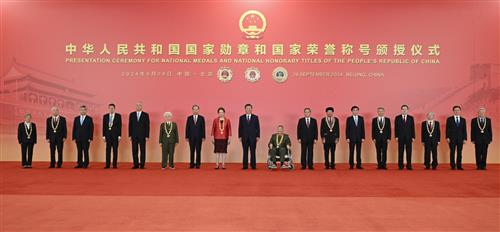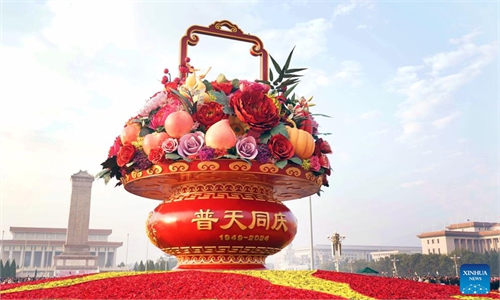
Harold Weldon Photo: Courtesy of Harold Weldon
Editor's Note:
For many foreigners, China may remain a mysterious land. However, for some China hands, the real China is credible, appealing and respectable. Their research and observations provide authentic reflections of China's transformation, mirroring the country's achievements and attractiveness. On October 1 of this year, the People's Republic of China (PRC) celebrated the 75th anniversary of its founding. The Global Times launches a series titled "China Hands: My China Voyages" to share the connections, stories and insights of influential scholars and analysts who study China, narrating the changes and accomplishments they witness in China, and presenting a multifaceted view of the country.
In the seventh article of the series, Harold Weldon (Weldon), an Australian writer and China advisor, shared his stories with Global Times (GT) reporter Ma Ruiqian.
GT: What changes and constants have you observed in your personal experiences in China?
Weldon: In 1985, at just 19 years old, I embarked on a life-changing journey through China. As part of a small Australia-China team, we retraced the Chinese Red Army's historic Long March for a world-first co-publishing project, The Long March, between my publishing company, Weldon's, and our Chinese partners.
The greatest change I have observed over 40 years is the poverty alleviation of the Chinese people. I witnessed this firsthand on the Long March when I met many of the village children in 1985 and again 26 years later during my second Long March journey for the book The New Long March. The children I had met in the grasslands were now adults with families and good jobs, living fulfilling lives. In 1985, the fruit and vegetables available in western Sichuan were very limited. Upon my return, we photographed vibrant markets and shops filled with produce from all over China.
Another major change was the remarkable development of transport infrastructure, including highways, freeways, airports, train stations and high-speed rail. In 1985, we traveled on dangerous mountain roads beside wild rivers like the Dadu River. Many areas required us to walk and trek with donkeys carrying our equipment. By the time we returned 26 years later, we traveled on new freeways all the way to the mountain pass of the great snow mountain Jiajin Mountain.
We hope to return to the Long March for a third time to document the many changes since our last journey in 2011, especially regarding high-speed rail, as over 40,000 kilometers of high-speed rail have been installed.
The greatest constant and deepest personal impression from my 40 years of coming to China has been the true spirit of the local people, especially in rural areas. I must be honest: no matter the development we witnessed, it was the smile of a child, the warm welcome of a grandmother to her humble home, or the invitation to share tea with local farmers, workers, or village chiefs in small mountain villages that left the most lasting impact on me.
GT: In your view, what are the main reasons behind China's successful development over the past 75 years?
Weldon: In my career, I have worked on several books and documentaries on modern Chinese history, so I'll begin by reflecting on China's story before 1949. There's a saying: "Those who forget the past are bound to relive it." I have interviewed Long March veterans, survivors of the Chinese civil war against the Kuomintang and those who endured the Japanese invasion.
The collective experience of war, tragedy, hardship and loss was driven by the hope for a better future for their country, families and children. These people-to-people exchanges revealed to me that, as Mao Zedong said, the Chinese people stood up on October 1, 1949. It reflects the power of collective will and a determination not to return to the past.
I must also emphasize China's self-confidence in its approach to development. I have witnessed the positive growth of this confidence that China today has a self-confidence in its own pathway for modern development. It's important for the West to understand that this confidence is a result of "China's Long March" of development, not a sudden phenomenon.
A confident country embraces its identity and values while actively collaborating with other nations to address global challenges with mutual respect and shared goals. I feel this deeply as a proud Australian and a long-time friend of China.
GT: How do you see the role of the Long March spirit in that success?
Weldon: I believe the Long March spirit represents an unbroken chain linking the hardships, sacrifices and ultimate victories of the original Long March to the ongoing successful development of China. It's crucial to remember that history does not unfold in a straight curve; rather, it is a winding journey like the Long March. If you keep your eyes on the horizon and remain determined in your vision, you will keep going. For me, modern China embodies the Long March spirit in several key areas that I have experienced in friendship, business and bilateral relations between our two countries: victory over adversity by never giving up, even against overwhelming odds; working together toward a common purpose; maintaining fearless optimism for the future; embracing the diversity of the people; recognizing that the Long March spirit is constantly evolving and is important for each generation.
I also see the Long March spirit reflected everywhere in China. It is a deep-rooted aspect of being Chinese — working together, resolutely not giving up, and not having to necessarily show your struggle externally but internally being determined to succeed.
GT: How do you perceive the 75th anniversary of the founding of the People's Republic of China as a historical milestone?
Weldon: I will view this through the lens of a historian. The founding of the PRC 75 years ago marks a significant milestone, primarily because the people of China endured numerous wars and struggles to achieve the victory of the revolution. While 75 years may be short in the vast narrative of China's history, or world history in general, the achievements during this period are remarkable. China has transformed from a largely war-torn agrarian society into an advanced economic power.
GT: Looking forward to the next 75 years, what are your thoughts on China's future economic development and its role in international affairs?
Weldon: I believe the whole world is watching China's economy, especially since China is the major trading partner for over 150 countries and regions. Since 2009, China has been Australia's largest trading partner, export market and import source for 15 consecutive years. So what happens in China is crucial to the global economy.
While I am not an economist or an expert in this field, my research and work with green technologies suggest that one of China's current economic priorities is about net-zero goals, sustainability and building a new economic foundation. China is currently adding more renewable energy capacity from 2023 to 2028 than the rest of the world combined.
This is a difficult challenge, but China is a vital pathfinder to a new economic era. I hope China and the US can collaborate to save the planet, and I see a potential role for Australia as a bridge between the two superpowers.



